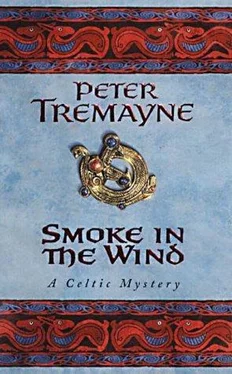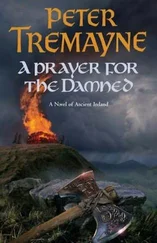Peter Tremayne - Smoke in the Wind
Здесь есть возможность читать онлайн «Peter Tremayne - Smoke in the Wind» весь текст электронной книги совершенно бесплатно (целиком полную версию без сокращений). В некоторых случаях можно слушать аудио, скачать через торрент в формате fb2 и присутствует краткое содержание. Жанр: Исторический детектив, на английском языке. Описание произведения, (предисловие) а так же отзывы посетителей доступны на портале библиотеки ЛибКат.
- Название:Smoke in the Wind
- Автор:
- Жанр:
- Год:неизвестен
- ISBN:нет данных
- Рейтинг книги:5 / 5. Голосов: 1
-
Избранное:Добавить в избранное
- Отзывы:
-
Ваша оценка:
- 100
- 1
- 2
- 3
- 4
- 5
Smoke in the Wind: краткое содержание, описание и аннотация
Предлагаем к чтению аннотацию, описание, краткое содержание или предисловие (зависит от того, что написал сам автор книги «Smoke in the Wind»). Если вы не нашли необходимую информацию о книге — напишите в комментариях, мы постараемся отыскать её.
Smoke in the Wind — читать онлайн бесплатно полную книгу (весь текст) целиком
Ниже представлен текст книги, разбитый по страницам. Система сохранения места последней прочитанной страницы, позволяет с удобством читать онлайн бесплатно книгу «Smoke in the Wind», без необходимости каждый раз заново искать на чём Вы остановились. Поставьте закладку, и сможете в любой момент перейти на страницу, на которой закончили чтение.
Интервал:
Закладка:
In no time at all the great abbey complex came in sight. Eadulf had to admit that it was an impressive collection of buildings, equal to any he had seen anywhere except in Rome. The buildings were a combination of grey granite and local woods.
They were greeted at the gates by one of the brethren, who seemed to have been expecting their arrival for he led them, without delay, directly to the chambers of Abbot Tryffin himself.
The abbot rose from his chair and came forward to greet them warmly in Fidelma’s native tongue. He obviously spoke the language as fluently as Brother Rhodri did. His tonsure was in the fashion of St John, the manner adopted by the churches of the Britons as well as those of Éireann. The head was shaved from the front to a line running from ear to ear, which some said was but a continuation of the tonsure adopted by the Druids, the wise men and sages of old. In his late forties, he was gaunt of face, thin-lipped and with a large nose, crisscrossed by tiny red veins, like a spider’s web. He smiled readily and there seemed a genuine warmth in the greeting. Yet his dark eyes held an anxious expression.
They were seated before a fire and served with mulled wine which Eadulf found welcome and comforting.
‘Are you in good health now, Brother Eadulf?’ the abbot asked as he settled in his chair. ‘Are you none the worse for your accident on board ship?’
‘None the worse,’ affirmed Eadulf solemnly.
‘And I suppose, as you informed me yesterday, Sister, that you are still both anxious to continue your journey to Canterbury? Is that so?’
‘We are,’ replied Fidelma. ‘As soon as we can find a ship sailing there, of course.’
The abbot nodded absently, drumming his fingers on the arm of his chair without apparently being aware of his action. It was obvious that some matter of importance was distracting him and he was having difficulty in articulating it.
‘However. .’ he began.
‘However,’ interposed Fidelma, ‘there is some problem which you require our help with.’
The abbot glanced at her in surprise. His eyes quickly narrowed. ‘How did you know? Has someone told you?’
‘Your concern is quite obvious,’ replied Fidelma.
Abbot Tryffin gave the answer some thought, relaxed and shrugged. ‘I suppose it is. It is true that we are confronted by a mystery which needs the advice of such an expert as yourself to explain it.’
Irritated, Eadulf looked up from contemplating the goblet of mulled wine.
‘Before I say more about this matter, may I ask you a question, Sister?’ asked the abbot.
Fidelma glanced towards Eadulf and replied with solemn humour: ‘Not every question deserves an answer.’
The abbot shifted uncomfortably. ‘That is truly said, Sister. I will ask, anyway. If I were to show you a mystery which intrigued you, would you remain a few days in this kingdom seeking an explanation of it?’
Fidelma indicated Eadulf, making it clear that the answer lay with him. ‘I am here merely accompanying the emissary of Archbishop Theodore of Canterbury. Your question is best put to him.’
Eadulf set down his wine, considering the matter. It was true that he had delayed in Muman for nearly a year before finally deciding to return to Canterbury. What difference would a delay of a few more days in the kingdom of Dyfed make on this return journey? It would probably take a few days before they could find a ship anyway. But what mystery was there to so distract the abbot that he would invite strangers to solve it, and a Saxon at that? Eadulf was still acutely mindful that he was in the land of the Britons. He became aware of the abbot’s close scrutiny as the latter waited with barely concealed impatience for the answer.
‘There would be a remuneration for your services,’ the abbot said quickly, as if payment were Eadulf’s concern.
‘Why would you seek our help? Surely there are enough wise heads in the kingdom of Dyfed to resolve the problem without calling in strangers?’ Eadulf’s tone indicated his vexation.
There was a movement beyond a screen at the far end of the room, and a tall, elderly man emerged from behind it. He had the build of a warrior, despite his age, and his features still retained the handsome mould of his youth. His white hair was tightly curled and beset by a gold circlet. His eyes were a striking, vivid blue, almost violet, with, at first glance, no discernible pupils. He wore clothes of rich satin and woven linen and wool. It was clear that he was a man of rank.
Eadulf noticed that Fidelma was rising from her seat and so he rose reluctantly as well.
The abbot coughed nervously. ‘You stand in the presence of-’
‘Of Gwlyddien, king of Dyfed,’ interrupted Fidelma, bowing her head in acknowledgment.
The elderly king came forward, smiling broadly, his hand held out in greeting. ‘You have a discerning eye, Fidelma of Cashel, and a quick wit, for I am sure that we have not met before.’
‘We have not, but the son of Nowy has been spoken of with respect among the religious of these islands. Was not your father also famed for the support he gave to the Church?’
Gwlyddien inclined his head. ‘Yet such as my reputation is, it provides little enough information by which to recognise me.’
‘True enough.’ Fidelma’s eyes held a twinkle. ‘It was by the royal symbol of Dyfed which you have embroidered on your cloak and by the gold signet on your finger that I inferred your identity. It was an elementary deduction.’
Gwlyddien slapped his thigh in appreciation and chuckled. ‘All I have heard of you seems true, Fidelma of Cashel.’ He turned with outstretched hand to Eadulf, who stood slightly alienated by this exchange. ‘And, of course, where Fidelma goes, one hears of her companion, Eadulf of Seaxmund’s Ham. Our bards tell us that two centuries ago the land of the South Folk, the very place from where you come, was once the kingdom of those Britons called the Trinovantes. From that tribe came one of the greatest of our kings — Cunobelinos, the Hound of Belinos, against whom not even the Roman emperors would dare to wage war.’
Eadulf shifted his weight nervously. ‘ Tempus edax rerum ,’ he muttered, remembering the line from Ovid.
Gwlyddien stared disapprovingly at him for a moment. Then he sighed and bowed his head as though accepting the inevitable.
‘Indeed, time does devour all things. Yet does not Virgil say that the Fates will find a way? What was once may yet be again.’
Eadulf restrained a shiver. He had heard that the Britons had not lost hope that one day they would drive the Saxons back again into the sea. He wondered how to respond but the moment had passed. Gwlyddien had seated himself in the chair vacated by the abbot, who took another.
‘Sit down,’ the king instructed with an impatient gesture. Fidelma and Eadulf resumed their seats. ‘The answer to our Saxon friend’s previous question is simple. Among the stories that we hear from travellers passing through this kingdom from Éireann, and the many brothers and sisters from your country who come to study here at this abbey, are tales of how Fidelma of Cashel has solved this riddle or unravelled that mystery. Having discussed the matter with Abbot Tryffin, I believe that God himself put you on a course to this place so that you may help us.’
Eadulf tried to suppress his feeling of annoyance that the king did not include him. It was clear that it was only Fidelma’s reputation that had prompted this summons to the abbey of Dewi Sant. The Britons barely tolerated him. He tried to keep his features impassive.
Fidelma was sitting back, regarding Gwlyddien with a studied expression. ‘My mentor, the Brehon Morann, used to say that compliments cost nothing, yet many pay dear for them. What cost follows these compliments you now bestow on me and on Brother Eadulf?’ The slight emphasis on Eadulf’s name implied a rebuke at their exclusion of him.
Читать дальшеИнтервал:
Закладка:
Похожие книги на «Smoke in the Wind»
Представляем Вашему вниманию похожие книги на «Smoke in the Wind» списком для выбора. Мы отобрали схожую по названию и смыслу литературу в надежде предоставить читателям больше вариантов отыскать новые, интересные, ещё непрочитанные произведения.
Обсуждение, отзывы о книге «Smoke in the Wind» и просто собственные мнения читателей. Оставьте ваши комментарии, напишите, что Вы думаете о произведении, его смысле или главных героях. Укажите что конкретно понравилось, а что нет, и почему Вы так считаете.












